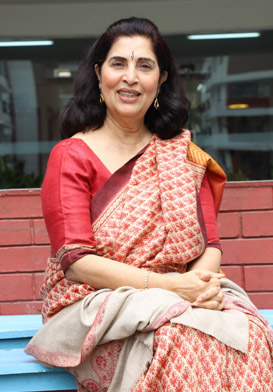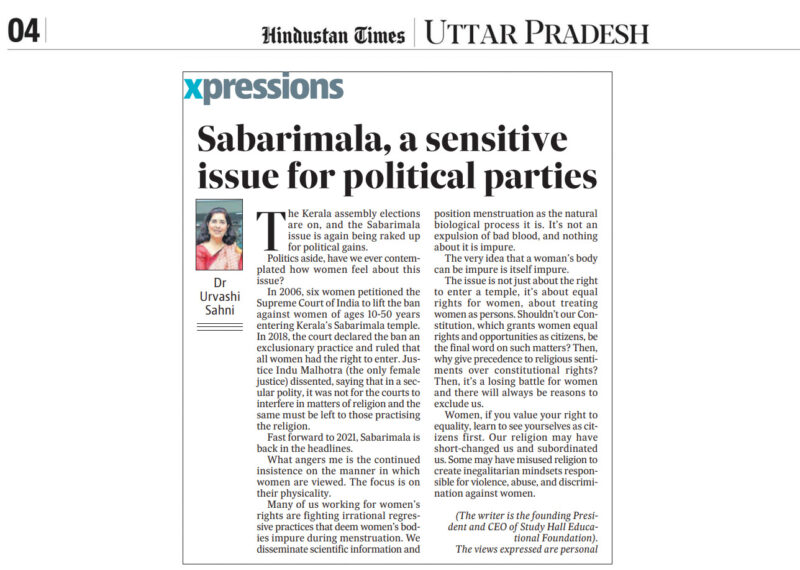
In 2006, 6 women members of the Indian Young Lawyers Association, petitioned the Supreme Court of India to lift the ban against women between the ages of 10 and 50 entering the Sabrimala Temple in Kerala. They argued that the practice was a violation of their constitutional rights and questioned the validity of provisions in the Kerala Hindu Places of Public Worship ( Authorisation of Entry) Rules act of 1965. They won as the Supreme Court ruled in 2018 that women of all age groups can enter Sabarimala Temple. The court ruled thus: We have no hesitation in saying that such an exclusionary practice violates the right of women to visit and enter a temple to freely practice Hindu religion and to exhibit her devotion towards Lord Ayappa. The denial of this right to women significantly denudes them of their right to worship. The verdict was passed with a 4-1 majority. The only female judge, Justice Indu Malhotra dissented. – saying that every individual should be allowed to practice their faith irrespective of whether the practice is rational or logical.
As we know there was resistance to this judgement and a petition to review the judgement was made. On 14th November 2019, the Supreme court Constitution Bench referred the review petitions as well as the writ petitions to a larger bench of not less than seven judges. This review is still pending as there is a difference of opinion even on the decision to review the petition.
The Congress party which claims to be a secular party has now raked up the issue again by promising to make such “violations of tradition” a cognizable offence!! This is clearly an effort to win over the Hindu voters in Kerala.
What angers me as it did Bindu Ammini, the first woman of menstruating age to enter Sabarimala on 2nd January 2019, is the continued insistence on viewing women as bodies and not persons. How does a person become impure? When do men become impure? When do they lose their izzat? Many of us working for women’s rights are also fighting against irrational and regressive practices of considering women’s bodies impure during menstruation, imposing a quarantine on them during this time. We are doing our best to disseminate scientific information about menstruation and positioning it as a natural biological process in women’s bodies, which should be celebrated because it signals the onset of fertility in women. That nothing about it renders her impure, and that women do not expel bad blood from their bodies during menstruation, that it is as natural as any other bodily process.
While we are trying to dispel myths and superstitions regarding menstruation, rescuing their person hood from objectification as bodies, learned women like Justice Indu Malhotra are supporting these very myths!!! Maybe she too needs to be part of our menstrual hygiene awareness camps. The very idea that a woman’s body can be impure is a repulsive impure idea. When and under what circumstances may I ask, is a man’s body rendered impure? Would we declare a rapist man’s body impure for instance? So that he may not enter Durga devi’s temple? Which religious tradition excludes a savarna man, however impure and repulsive his deeds from any temple? For dalit men of course the story is different. They are deemed to be rendered impure by their caste and so seem to warrant exclusion. Again a despicable, impure practice!
Furthermore, shouldn’t our constitution which grants women equal rights and opportunities as a citizen, be the final word on such matters? If we continue to give precedence to religious sentiment over constitutional rights, then women are fighting a losing battle and there will always be reasons to exclude them, to consider them less, impure etc. it is our constitution and our citizenship that grants us equal rights, not our religions – any religion. So Sisters – if you value your right to equality, that many of your sisters fought for, then learn to look at yourselves as citizens first and last, not as Hindu, Muslim or Christian women. Our religions have always short changed us, constructed a perception of us as unequal, subordinate, imposed sexist norms of chastity on us, which men are exempt from and created the inegalitarian mindsets that are responsible for so much violence, abuse and discrimination against women, which has been normalized, naturalized and which receives spoken and unspoken social sanction.
The issue is not just about having the right to enter a temple, it is about equal rights for women, about treating women as persons, about refusing to accept a label of being ‘impure’ at any stage or age of our lives.
Finally – it is about time that women who make up 50% of the countries electorate, start demanding that issues of their safety in their home, on their streets and in their mothers wombs be taken seriously by political parties seeking their vote. Indian women are unequal, unsafe, unwanted and unfree in free India! While Congress is rushing to make barring women entry in Sabarimala an election issue, I don’t see it or any party making women’s safety, right to free mobility, to equality, to inclusion being made an election issue. Women are still waiting for the 33% reservation in Parliament – this inclusion of women has not been seen as deserving to become an election issue for any party, while exclusion of women has!


 DONATE
DONATE


 Volunteer
Volunteer
 Work With Us
Work With Us
